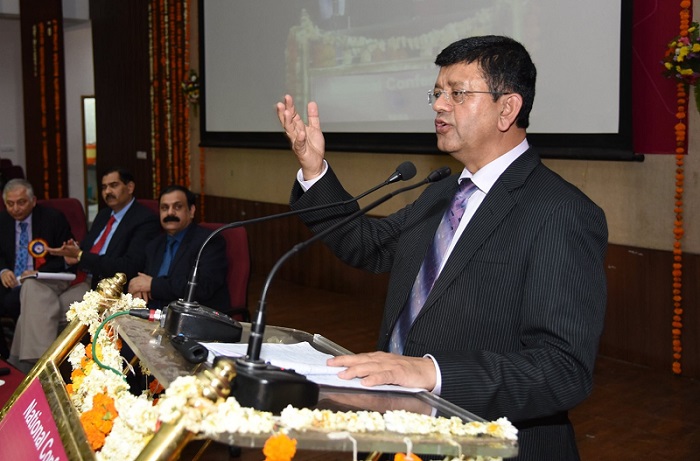Dr. Ramhari Lamichhane, Director General, Colombo Plan Staff College, Manila, Philippines, spoke about the quality TVET for skills readiness for the 21st century. Dr. Ramhari emphasized on the importance of human resource development in the country and the need to develop competencies of the youth for global opportunities. To develop the competencies of the youth, we must first identify the challenges of the current TVET system.
Challenges of TVET:
- A mismatch between demand and supply
- Fast-changing nature of labour market
- Sustainable financing
- Social recognition of TVET
Building competencies for global competitiveness:
- The youth must first develop basic competencies like knowledge, skills, and attitudes
- In addition to the basic competencies, we must develop their abilities and personality traits
- Only after achieving the above, we will develop competencies
 For building competencies among the youth, we have to bring qualitative changes in the education system, with high-quality assurance. For quality assurance in the education system, we need to develop inputs like curriculum, textbooks, teaching material, human resources, and other resources.
For building competencies among the youth, we have to bring qualitative changes in the education system, with high-quality assurance. For quality assurance in the education system, we need to develop inputs like curriculum, textbooks, teaching material, human resources, and other resources.
These inputs will, in turn, lead to a process in which develops learning pedagogy, efficient evaluation, and certification system. The output of this process will be qualified graduates. Outcomes for this would be employment, better living standards, social harmony, and increased GDP. This framework of input, process, and output is needed to build a quality TVET system.
Importance of PDCA (Plan, Do, Check, Act) in TVET institute:
TVET institutes must make a strategic plan for coming up with a quality policy with HR plan, operation plan, financial plan along with a plan for image-building. Institutes must develop and revise the curriculum, recruit and train staff who can conduct courses based on the updated curriculum, manage infrastructure and equipment. Under “check”, TVET institutes must look after program evaluation, tracer study, supervision and monitoring. Institutes must also act upon feedback management, to develop a new standard or baseline and recommend changes based on learning.
TVET institutes must also develop their infrastructure in terms of labs, curriculum, and trainers to teach and train students in the 21st-century skills, like core subjects; life and career skills; learning and innovation skills; information, media and technology skills.
We have to create a TVET ecosystem to address future demand. Therefore, skills we impart among the youth must prepare them for marketability, employability, and readiness for citizenship having technical, digital, entrepreneurial and social skills.













Comments 2